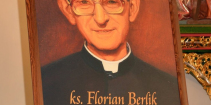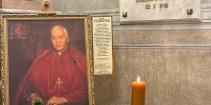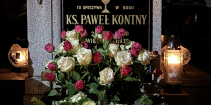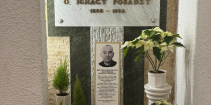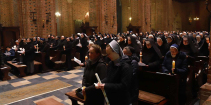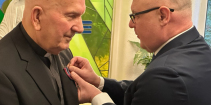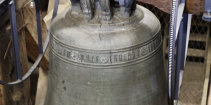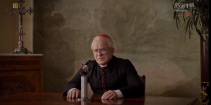Society of Christ Fathers for Poles Living Abroad (Latin: Societas Christi pro Emigrantibus Polonis), often abbreviated to SChr (Polish: TChr), is a monastic congregation established on the basis of the Code of Canon Law. It gathers priests and brothers with simple vows taken (initially, members take temporary vows and then perpetual vows of chastity, poverty and obedience).
The congregation was founded on 8th September 1932 by the Primate of Poland, Cardinal August Hlond in cooperation with Rev. Ignacy Posadzy (founder of the Missionary Sisters of Christ the King) in Potulice near Nakło. Cardinal August Hlond was also responsible for drawing up the Congregation"s Constitution. The Society opened its own theological seminary and established houses in Gniezno (1933), Poznań and Puszczykowo (1935), and Dolsk (1937) as well as a publishing house with printing plant in Potulice. In 1933, the first issue of a bimonthly devoted to the ministry among the Polish emigrants was published under the title of „Głos Seminarium Zagranicznego” [Voice of the Foreign Seminary]. Three years later, the Society started to publish a monthly focused on the Bible and the Liturgy („Msza Święta” [The Mass]), which was shortly followed by a hagiographical quarterly „Cześć Świętych Polskich” [In Honor of the Polish Saints]. First groups of Society members left for Paris and London in 1937 and for Estonia in 1938 in order to serve local Polish communities. The number of Congregation members increased in 1939 from 40 to 184.
During WWII, members of the Society performed their duties officially only in Bydgoszcz and in the General Gouvernement, while other members served secretly in the region of Pyzdry and Ostrów Wielkopolski as well as in Germany, where they had been taken away by the occupier as forced laborers. Having obtained a relevant permit from the Nazis, they also carried out the duties of chaplains in transition camps. 26 members of the Congregation lost their lives in that period. At the same time, 43 new priests were ordained after having completed the underground theological education in Kraków. After the outbreak of WWII, the Main House in Poznań and the Mother House in Potulice were seized by the Germans. Thus, the Congregation lost its entire property.
Once the war was over, almost nothing could be recovered but the destroyed building on the island of Ostrów Tumski in Poznań and the house in Puszczykowo. Since then, the Main House in Poznań has been the hub of the Congregation. Coming home after the turmoil of war, members of the Society joined the pastoral work in the North-Western region of Poland. On 6th May 1945, Rev. Florian Berlik, SChr celebrated the first Mass held in Szczecin since the end of the war. Then, they extended their pastoral work into further areas (Pyrzyce, Kamień Pomorski, Trzebiatów). Despite having handed over a great number of parishes to the diocese, the Society"s members serve in 18 parishes within the diocese of Szczecin as well as in some parishes that belong to the dioceses of Gdańsk, Wrocław and Koszalin.
Leaving country in order to perform pastoral work abroad was significantly hampered by the new authorities. Although obtaining the passport was a complicated and difficult task, members of the Society somehow managed to perform their pastoral duties among the Polish emigrants. In 1945, in order to provide a regular influx of new candidates for priesthood, a dormitory for middle school students was opened in Poznań. A year later, it was converted into the Lower Theological Seminary. With a single break, it remained in operation until 1962. The Congregation returned to considering the creation of its own Higher Theological Seminary. The philosophy department was established in 1948 in Ziębice. Two years later, the theological department was created in Poznań
In 1948, on the twenty-second day of October, the Founder of the Society of Christ Fathers, the Primate of Poland, Cardinal August Hlond passed away in Warsaw. In 1964, the Congregation was approved by the Holy See and the subsequent years brought a rapid development of its structure and the establishment of a large number of new agencies. After "the thaw" of 1957, when the process of obtaining passports became somehow facilitated, the Congregation started to send more members on foreign missions. Priests and brothers left for new countries and traveled to other continents, where they would carry out their pastoral work. In 1976, the Congregation had 124 monastic houses and worship centers, served in 34 parishes in North-Western and South-Western regions of Poland, as well as in 84 parishes located abroad. At that time, the Society gathered as many as 373 members (including 217 priests). The General Council in Poznań exercised jurisdiction over 6 provinces: American province - headquartered in Sterling Heights, Michigan; Brazilian - headquartered in Curitiba; Australian - headquartered in Sydney; English - headquartered in London; French - headquartered in Hesdingneul-les-Bethune (currently in Aulnay-sous-Bois); and German - headquartered in Essen.
Currently (as of 2 April 2011), the Congregation has 458 members, including 393 priests, 20 friars, 37 seminarists and 8 novices. Its mission is realized in 6 provinces and the so-called Eastern Agency, covering the total of 20 countries (Poland, Brazil, the USA, Canada, Australia, New Zealand, France, Spain, Germany, the Netherlands, Italy, Hungary, Great Britain, South Africa, Northern Ireland, Iceland, Ukraine, Belarus, Kazakhstan, and Romania).
The Main House of the Congregation and the General Curia are located in Poznań. The Higher Theological Seminary of the Society of Christ Fathers is headquartered in the Main House. It serves the purpose of educating seminarists from Poland and other countries where Polish communities are visible (the United States, Brazil, Germany, Ukraine, Belarus). Candidates for priesthood need to complete a year-long novitiate in Mórkowo near Leszno. Only then, they can continue the period of formation in the seminary for the next six years. Candidates for brothers are required to serve a juniorate for several years once they finish the period of candidacy and novitiate. Apart from philosophical and theological studies, the intellectual formation of the Congregation"s members embraces learning foreign languages and studying the issues related to the performance of pastoral work on emigration, as well. Jan Jabłoński Seminary Library in Poznań gathers materials (especially periodicals published by the Polish communities around the world, such as the valuable collection of Jan Kowalik"s publishings) on the history of the Polish emigration.
oprac. ks. dr Marek Grygiel TChr
